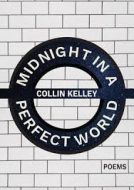 Collin Kelley
Collin Kelley
Midnight in a Perfect World
Sibling Rivalry Press
Reviewer: Ann Wehrman
Collin Kelley’s Midnight in a Perfect World takes the reader across a turbulent sea of passions, betrayal, and transcendence, using free verse and bold imagery. The narrative and lyrical poems convey suffering incurred through diverse experiences, expressing a wide gamut of psychological states: delicacy, intensity, tenderness, hurt, resentment, superficiality, indifference, and compassion.
Kelley writes in an open, natural, and deeply personal manner. His poems feel compelled, as if the speaker is pouring out his heart to a friend as they sit together at a bar over drinks or share a long walk over frost-bound fields. Direct, even blatant in language and subject matter, although restrained by the poet’s mature self-awareness, the poems rush forth like a flooding creek. The collection chronicles both physical and emotional desire, romantic love delineated as profoundly multifaceted. The poems reflect resilience, the speaker continuing to strive for an ideal union even after repeated loss and betrayal.
The collection has multiple faces or focal points, including:
1. A farewell to Christopher, a former lover.
2. Confessional mementos of love affairs and trysts.
3. Idealized and unfulfilled fantasy.
This book’s title, Midnight in a Perfect World, is ironic: a perfect world implies perfect love, faithful, eternal, and true. Midnight seems to indicate a zero point, an absolute, an epitome. However, Kelley’s reference to a string of heartbreaks starkly contrasts with that ideal.
For further insight, one might consider the frontispiece quote from DJ Shadow: “Insight, foresight, more sight – the clock on the wall reads a quarter past midnight.” Here are partial lyrics of that song:
Insight, foresight, more sight
The clock on the wall is a quarter past midnight
I don’t love you
Heading to garden of love, ah
Life come seeking of love, of love
Those lyrics might also have private significance to Kelley, a connection to which he seems to allude in his elegy to his late friend and lover, Christopher. The last lines of “Atonement” read:
I mourn you with celluloid, Christopher, in dark rooms where stories unfurl, with rushing water, with a city that pulls me near and pushes me away, with clocks that always know the score.
The poem begins by describing the setting:
I am sitting in a London cinema watching Vanessa Redgrave make amends for a life of deceit, to a soundtrack of rushing water I believe subliminal, to drive home melancholy, but when silhouetted heads turn in search, I realize it is real. It is raining hard outside, echoing behind the screen, and suddenly your death comes rushing back to me, Christopher, whom I have not mourned.
Kelley goes on to remember the relatively naïve and tender beginning of his romance with Christopher, and acknowledges that he did not follow through later, when Christopher was ill with HIV and on the street and finally lost his battle for life. Now, Kelley must face his own heartbreak, and in this tender reminiscence, he strives for restitution.
Kelley’s dedication of this collection reads, “For Christopher Jason Siddons.”
The collection also involves emotional remembrance of multiple passionate affairs, lyrical and descriptive, as well as cerebral. Consider the imagery of “In the Cut”:
I remember you folded in half,
only your right side visible
in the kitchen doorway,
just enough to see your hand
on his hip, his arm
around your neck,
the passion in one eye.
*
When your note arrives two days later,
chiding me for not saying goodbye,
an ocean divides us.
I realize I should have unfolded you,
to read the whole message,
risked being cut in half.
In “Revenant,” Kelley writes,
We had sex last night, not with each other,
but we might as well have. It would save us
the trouble of totting up the score,
our extravagant, unquenchable appetites.
I’ve never been so fat and so empty, I think …
Insatiable hunger burdens the speaker, masquerading as desire for food, though he actually hungers for genuine commitment and continues to seek it, his Holy Grail.
One remarkable poem, “Kate Bush Appears on Night Flight, 1981,” shows another side of the story:
Midnight in the forbidden living room, closing doors quietly behind me, unknowingly opening a path from which I will never veer, even later when I become older, succumbing to any zeitgeist.
I turn on the RV and she somersaults across the screen, startling the rolling vertical hold into stillness, her siren voice makes me fumble in the dark for volume control.
*
That night I put on my armor, never had a ring put on my finger, blew kisses across the ocean, for inspiration and strength, for God to keep her even when he wasn’t keeping me, and now, when I am driving or dancing, walking in Los Angeles or London, the song remains the same, her name an utterance: Kate, Kate, Kate.
It is tempting to think one understands a written work, but how often is the reader’s interpretation wildly off track? Readers are cautioned to avoid taking creative writing as autobiography. With that noted, this poignant poem opens a door to a different type of love, a dream personified by a female love object, in contrast to the other love poems in the collection, written about males. So, who is Kelley’s muse? This consideration leads one back to the first poem in the collection, “Feast,” which begins, “All the poems will be about you, / so stop asking.” One is unable to stop, however, caught in Kelley’s net of shared love and loss, his persistent dream of ideal love at the top of the stairs, as the clock strikes midnight.

